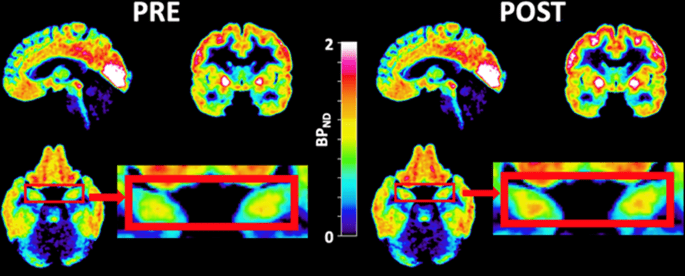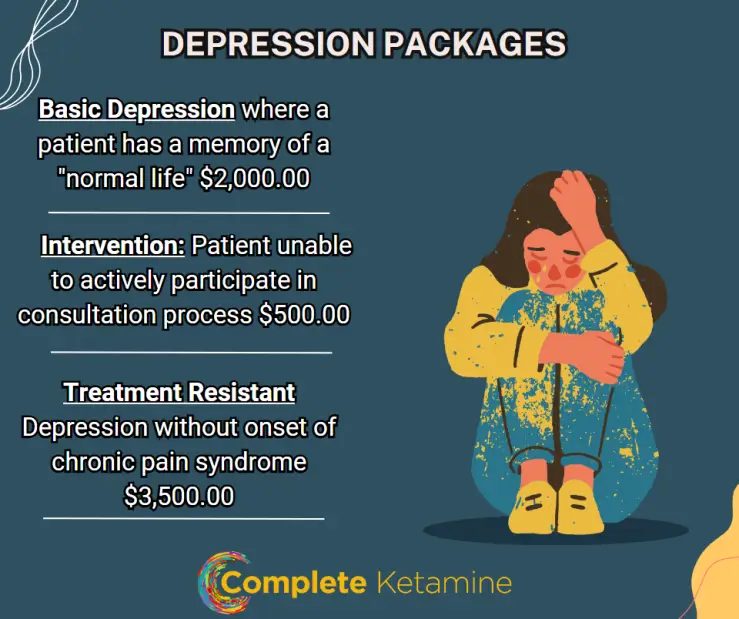Stop Depression: Turn the lights On
Ruminating Thoughts to Neuroplasticity
Patients undergoing ketamine therapy may experience discomfort or nervousness as ruminating thoughts diminish.
Years of adapting to a life of depression can create a sense of familiarity, leading to feelings of unease or panic when these persistent thoughts subside. This underscores the importance of careful monitoring during treatment.
Ketamine is increasingly recognized for its ability to rapidly disrupt treatment-resistant depression by shifting the brain out of a rigid, defensive state and into a state of neuroplasticity.
Unlike traditional antidepressants that take weeks to work, ketamine stimulates spontaneous brain activation, increasing communication between brain regions responsible for mood regulation. (Psychology Today)
By enhancing neuroplasticity, ketamine allows for the formation of new neural connections, facilitating the adoption of healthier thought patterns and behaviors.
This process can lead to a significant reduction in depressive symptoms and an improvement in overall mental health. (PMC Study)
It's important to note that while ketamine can provide rapid relief, the integration of psychotherapy during the period of increased neuroplasticity can further solidify these positive changes, leading to more sustained improvements. (Research on Integration)
Patients should be aware that the transition from long-standing depressive thought patterns to more adaptive ones can be challenging. Open communication with healthcare providers and the incorporation of therapeutic support can help navigate this adjustment period effectively.
Years of adapting to a life of depression can create a sense of familiarity, leading to feelings of unease or panic when these persistent thoughts subside. This underscores the importance of careful monitoring during treatment.
Ketamine is increasingly recognized for its ability to rapidly disrupt treatment-resistant depression by shifting the brain out of a rigid, defensive state and into a state of neuroplasticity.
Unlike traditional antidepressants that take weeks to work, ketamine stimulates spontaneous brain activation, increasing communication between brain regions responsible for mood regulation. (Psychology Today)
By enhancing neuroplasticity, ketamine allows for the formation of new neural connections, facilitating the adoption of healthier thought patterns and behaviors.
This process can lead to a significant reduction in depressive symptoms and an improvement in overall mental health. (PMC Study)
It's important to note that while ketamine can provide rapid relief, the integration of psychotherapy during the period of increased neuroplasticity can further solidify these positive changes, leading to more sustained improvements. (Research on Integration)
Patients should be aware that the transition from long-standing depressive thought patterns to more adaptive ones can be challenging. Open communication with healthcare providers and the incorporation of therapeutic support can help navigate this adjustment period effectively.
Problem Solving & Glutamate Surge
Research shows that ketamine blocks NMDA receptors, leading to an increase in glutamate release. This rapid surge in neural activity helps reconnect dormant pathways in the prefrontal cortex—areas typically shut down by chronic stress, depression, and trauma. (Activation of Glutamatergic Neurotransmission by Ketamine)
Patients often do not realize how much executive function has been lost until it begins to return. The prefrontal cortex is responsible for problem-solving, organization, and goal-directed behavior. Many who have struggled for weeks or months to complete simple tasks suddenly find themselves able to take action and resolve long-standing responsibilities. (Ketamine Rapidly Improves Cognitive Function)
This shift can feel overwhelming at first, as patients adjust to their newfound mental clarity and motivation. While the ability to function improves, an adjustment period is necessary to become comfortable with these changes and reintegrate daily activities that once felt impossible.
Unlike traditional therapy, which often requires prolonged introspection and negotiation with a therapist, ketamine naturally awakens emotional and behavioral processing, allowing individuals to confront suppressed emotions and patterns in real time.
Patients often do not realize how much executive function has been lost until it begins to return. The prefrontal cortex is responsible for problem-solving, organization, and goal-directed behavior. Many who have struggled for weeks or months to complete simple tasks suddenly find themselves able to take action and resolve long-standing responsibilities. (Ketamine Rapidly Improves Cognitive Function)
This shift can feel overwhelming at first, as patients adjust to their newfound mental clarity and motivation. While the ability to function improves, an adjustment period is necessary to become comfortable with these changes and reintegrate daily activities that once felt impossible.
Unlike traditional therapy, which often requires prolonged introspection and negotiation with a therapist, ketamine naturally awakens emotional and behavioral processing, allowing individuals to confront suppressed emotions and patterns in real time.
Negative Thought Loops & Cognitive Flexibility
Functional MRI studies reveal that ketamine increases connectivity in brain regions associated with self-awareness, emotional regulation, and cognitive flexibility. (Nature Study on Ketamine & Brain Connectivity)
This heightened neuroplasticity enables patients to step out of negative thought loops and engage in new, adaptive behaviors—without the typical resistance experienced in traditional talk therapy. (NCBI Article on Ketamine & Cognitive Function)
The long-term effectiveness of ketamine therapy, however, is often determined by an individual's ability to integrate these changes into their daily life. Research suggests that patients who actively engage in therapy and self-reflection experience more lasting improvements. (Frontiers in Psychiatry - Integration of Ketamine Therapy)
Additionally, younger patients and those who struggle with introspection may find it challenging to adjust to the sudden return of executive function and self-awareness. Guided psychotherapy and structured behavioral interventions can help ensure that the newly reawakened cognitive abilities are effectively harnessed. (Psychiatric Times on Ketamine & Self-Awareness)
This heightened neuroplasticity enables patients to step out of negative thought loops and engage in new, adaptive behaviors—without the typical resistance experienced in traditional talk therapy. (NCBI Article on Ketamine & Cognitive Function)
The long-term effectiveness of ketamine therapy, however, is often determined by an individual's ability to integrate these changes into their daily life. Research suggests that patients who actively engage in therapy and self-reflection experience more lasting improvements. (Frontiers in Psychiatry - Integration of Ketamine Therapy)
Additionally, younger patients and those who struggle with introspection may find it challenging to adjust to the sudden return of executive function and self-awareness. Guided psychotherapy and structured behavioral interventions can help ensure that the newly reawakened cognitive abilities are effectively harnessed. (Psychiatric Times on Ketamine & Self-Awareness)
'Fight Mode' to Healing
Ketamine's ability to rapidly transition the brain out of 'fight mode' into a receptive state makes it a breakthrough treatment for depression. Unlike traditional antidepressants that gradually alter brain chemistry, ketamine quickly modulates neural activity, allowing patients to actively engage in their healing process. (Yale Medicine - Ketamine for Depression)
This shift enables deeper introspection, faster behavioral adaptation, and a newfound sense of control over one’s mental state. By awakening the brain, ketamine provides patients with an opportunity to move beyond survival-based coping mechanisms into a space of growth, emotional integration, and long-term healing. (PMC - Rapid and Sustained Antidepressant Effects of Ketamine)
At KBlend, we focus on individualized patient care by using highly skilled staff who can titrate ketamine to precise doses, ensuring that patients can guide their treatment when they are ready and willing. This patient-centered approach fosters lasting behavioral changes rather than reliance on artificial chemical replacements. (Frontiers in Psychiatry - Ketamine Therapy Integration)
This shift enables deeper introspection, faster behavioral adaptation, and a newfound sense of control over one’s mental state. By awakening the brain, ketamine provides patients with an opportunity to move beyond survival-based coping mechanisms into a space of growth, emotional integration, and long-term healing. (PMC - Rapid and Sustained Antidepressant Effects of Ketamine)
At KBlend, we focus on individualized patient care by using highly skilled staff who can titrate ketamine to precise doses, ensuring that patients can guide their treatment when they are ready and willing. This patient-centered approach fosters lasting behavioral changes rather than reliance on artificial chemical replacements. (Frontiers in Psychiatry - Ketamine Therapy Integration)

Buying Options:
- Category: Depression
- All pricing packages are subject to medical approval
- Refunds offered if a patient does not qualify for a discounted internet purchase
- Internet pricing only available online when paid in advance of consultation
- Internet pricing not available in-store or over the phone
For more details on ketamine treatment, pricing, and eligibility, visit our FAQ page.
What to Know Before Starting Ketamine Therapy
1. Schedule and Commitment
- ALL Treatments are performed in Monroe or Lansing Location.
- Most patients undergo two to three treatments per week over a two to three-week period.
- A typical initial treatment series consists of six infusions.
- Larger Packages may include more than 6 infusions.
- Intervention is one-time, one infusion, unless altered by provider
2. Transportation / Post-Treatment
- Patients must arrange for a driver to and from the clinic due to post-treatment effects.
- After each infusion, patients are monitored to ensure stability before discharge.
- Patients and Drivers will be given discharge instructions.
3. Pre-Treatment Preparations
- On the day of your session, avoid heavy meals to reduce nausea.
- Stay well-hydrated leading up to your appointment.
- Stop eating and drinking 4 hours prior to treatment.
- Do not come in dehydrated!
4. Medical Considerations
- Patients with high blood pressure should have their condition controlled before starting treatment.
- During treatment, vital signs (heart rate, blood pressure, oxygen levels) are closely monitored.
- Avoid Conflict and difficult situations before treatment.
5. Potential Side Effects
- Some patients may experience dissociation (a floating sensation or altered perception).
- Mild nausea can occur but can often be managed with proper dietary adjustments.
6. Patient & Caregiver Education
- Understanding the process and potential side effects helps ensure a successful treatment experience.
- Patients and caregivers should review all information before starting therapy.

